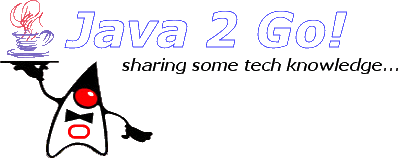by Wellington Carvalho
I hope my feedback can help those who want to prepare for The Web Component Developer exam (SCWCD) for JEE 5. I will use the same structure of an older post that Fabio Souza wrote to pass his own experience with SCJP 5 exams.
Main reading resourceHead First Servlets and JSP: Passing the Sun Certified Web Component Developer Exam
The first edition of the book deals with J2EE 1.4 spec, but the changes in JEE 5 were
most related to EJB 3, so I think you won’t have troubles with the exam! But if you want, the second edition of the Head First Servlets and JSP is prepared for JEE 5 and you can find it here:
http://oreilly.com/catalog/9780596516680/?CMP=AFC-ak_book&ATT=Head+First+Servlets+and+JSPMain resources for exercisesI used an application similar to Whizlabz named Enthuware. Enthuware is an exercise tool with many tests that covers all the objectives mentioned by Sun. The exercises of Enthuware are very similar to the exam, and you have good explanations, no matter the answer is right or wrong.
In order to get a better performance in your study you should take the standard tests of Enthuware sequentially and exclusively when you have read the entire SCWCD book.
To evaluate your chapter’s knowledgement you should take the objective-wise tests only after reading the chapter. To get the full version of Enthuware you will spend around US$29,00 which is cheaper than the other: Whizlabz (US$74,95). If you fail the SCWCD exam the company guarantee your money back (must get at least 70% in the tests).
My study scheduleIt took me 35 days to read all the 14 chapters and to do all the tests
and exercises of Enthuware. I spent 2 hours and a half per day to read the chapter and 1 hour to do the exercises. In the week before the exam I just took the standard tests and reviewed the material.
I think this schedule is reasonable to people that is working with JEE, however if you aren’t using JEE in your daily work you should reserve a longer study time.
The examIn my opinion the exam is relatively easy to people that have work experience in JEE development, however you need to pay attention to every detail because the exam has good tricks hidden in the code. But don’t get scared. Most of them are covered by Enthuware.
To take this exam you must know about all the objectives listed by Sun, but with a special care on these below:
Servlet Technology Model
Expression Language (EL)
Custom Tag Library - Classic Model
JSP Standard Actions
It is important to remember that you need at least 70% to pass, but trust me (and Enthuware), if you start scoring more than 70% in the standard tests, you will pass easily.
 Switch to new Dynamic Views
Switch to new Dynamic Views






